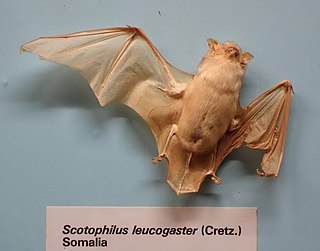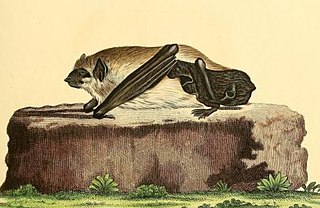
The lesser yellow bat is a vesper bat found only on Madagascar and Réunion. On Réunion, it was considered common early in the 19th century, but was last sighted late in the 19th century. Only a single specimen attributed to this species, collected in 1868, is known from Madagascar. It was listed as a critically endangered species in 1996 due to habitat loss, and may be extinct.
The greater Papuan pipistrelle is a species of vesper bat found in Papua New Guinea and Irian Jaya.
Dormer's bat or Dormer's pipistrelle is a species of vesper bat. It is monotypical for its genus.
The Sulawesi yellow bat is a species of vesper bat. It is found only in Indonesia.

The greater Asiatic yellow bat is a species of vesper bat.

The lesser Asiatic yellow bat is a species of vesper bat. It is found in Bangladesh, India, Indonesia, Malaysia, Pakistan, the Philippines, Sri Lanka, and Taiwan.

The white-bellied yellow bat or white-bellied house bat, is a species of vesper bat in the genus Scotophilus, the house bats. It can be found in Angola, Benin, Botswana, Burkina Faso, Cameroon, Central African Republic, Chad, Ivory Coast, Gambia, Ghana, Guinea, Guinea-Bissau, Kenya, Mali, Mauritania, Namibia, Niger, Nigeria, Senegal, Sierra Leone, Sudan, Togo, Uganda, and Zambia. It is found in dry and moist savanna and open woodland. It is a common species with a very wide range, and the International Union for Conservation of Nature has assessed its conservation status as being of "least concern".

Schreber's yellow bat or the giant house bat, is a species of vesper bat. It is found in Benin, Democratic Republic of the Congo, Ivory Coast, Ghana, Kenya, Malawi, Mozambique, Nigeria, Senegal, Tanzania, Togo, and Zimbabwe. Its natural habitats are subtropical or tropical moist lowland forests, dry savanna, and moist savanna. It is an uncommon species and its biology is poorly known. It was first described in 1774 by the German naturalist Johann Christian Daniel von Schreber, who named it Vespertilio nigrita. It was later transferred to the genus Scotophilus, making it Scotophilus nigrita.
Robbins's yellow bat is a species of vesper bat. It is found in Ivory Coast, Ghana, and Uganda.
The nut-colored yellow bat is a species of vesper bat. It can be found in Cameroon, Democratic Republic of the Congo, Ivory Coast, Equatorial Guinea, Ghana, Guinea, Kenya, Liberia, Nigeria, Rwanda, Sierra Leone, and Uganda. It is found in subtropical or tropical moist lowland forests.

The robust yellow bat is a species of vesper bat. It is found only in Madagascar.

The greenish yellow bat is a species of vesper bat. It is found in Benin, Botswana, Burkina Faso, Cameroon, Central African Republic, Chad, Ivory Coast, Ethiopia, Gambia, Ghana, Kenya, Madagascar, Malawi, Mali, Mozambique, Namibia, Niger, Nigeria, Senegal, South Africa, Sudan, Tanzania, Togo, Zambia, and Zimbabwe. Its natural habitats are dry and moist savanna.

The Vespertilioninae are a subfamily of vesper bats from the family Vespertilionidae.

Scotophilus is a genus of vespertilionid bats commonly called yellow bats. They are found in southern Asia and Africa.

Andrew Rebori's house bat is a species of bat found in Africa.

Ejeta's house bat is a species of vesper bat found in Ethiopia. It was described as a new species of bat in 2014.
Livingstone's house bat is a species of bat found in Africa.

The Marovaza house bat is a species of bat found in Madagascar.

Trujillo's house bat is a species of vesper bat found in Kenya.

The western yellow bat is a species of vesper bat endemic to Madagascar.















